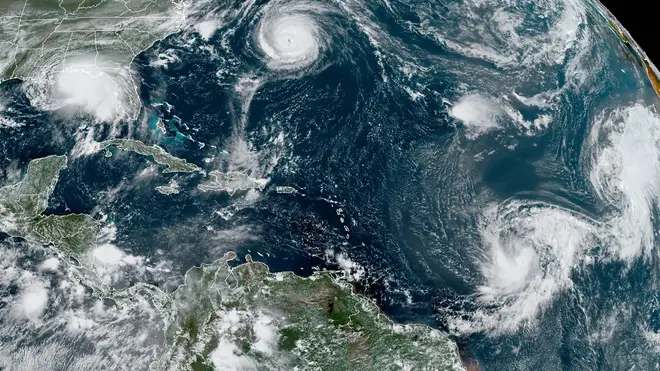
Ben Kentish 10pm - 1am
11 May 2022, 19:34

The study was carried out by the National Oceanic and Atmospheric Administration.
Cleaner air in the US and Europe is brewing more Atlantic hurricanes, a study has found.
The US National Oceanic and Atmospheric Administration study links changes in regionalised air pollution across the globe to storm activity going both up and down.
A 50% decrease in pollution particles and droplets in Europe and the US is linked to a 33% increase in Atlantic storm formation in the past couple of decades, while the opposite is happening in the Pacific with more pollution and fewer typhoons, according to the study published in Wednesday’s Science Advances.
NOAA hurricane scientist Hiroyuki Murakami ran numerous climate computer simulations to explain changes in storm activity in different parts of the globe that cannot be explained by natural climate cycles and found a link to aerosol pollution from industry and cars — sulphur particles and droplets in the air that make it hard to breathe and see.
Scientists had long known that aerosol pollution cools the air, at times reducing the larger effects of greenhouse gases from the burning of fossil fuel, and earlier studies mentioned it as a possibility in an increase in Atlantic storms, but Mr Murakami found it a factor around the world and a more direct link.
Hurricanes need warm water — which is warmed by the air — for fuel and are harmed by wind shear, which changes in upper level winds that can decapitate storm tops.
Cleaner air in the Atlantic and dirtier air in the Pacific, from pollution in China and India, interfere with both of those, Mr Murakami said.
In the Atlantic, aerosol pollution peaked around 1980 and has been dropping steadily since. That means the cooling that masked some of the greenhouse gas warming is going away, so sea surface temperatures are increasing even more, Mr Murakami said.
On top of that the lack of cooling aerosols has helped push the jet stream — the river of air that moves weather from west to east on a rollercoaster-like path — further north, reducing the shear that had been dampening hurricane formation.
“That’s why the Atlantic has gone pretty much crazy since the mid-90s and why it was so quiet in the 70s and 80s,” said climate and hurricane scientist Jim Kossin of risk firm the Climate Service.
He added that aerosol pollution “gave a lot of people in the 70s and 80s a break, but we’re all paying for it now”.
There are other factors in tropical cyclone activity with La Nina and El Nino — natural fluctuations in equatorial Pacific temperatures that alter climate worldwide — being huge.
Human-caused climate change from greenhouse gases, that will grow as aerosol pollution reductions level out, is another, and there other natural long-term climatic oscillations, Mr Murakami said.
Climate change from greenhouse gases is expected to reduce the overall number of storms slightly, but increase the number and strength of the most intense hurricanes, make them wetter and increase storm surge flooding, scientists said.
While aerosol cooling is maybe half to a third smaller than the warming from greenhouse gases, it is about twice as effective in reducing tropical cyclone intensity compared with warming increasing it, said Columbia University climate scientist Adam Sobel.
As aerosol pollution stays at low levels in the Atlantic and greenhouse gas emissions grow, climate change’s impact on storms will increase in the future and become more prominent, Mr Murakami said.
In the Pacific, aerosol pollution from Asian nations has gone up 50% from 1980 to 2010 and is starting to drop now. Tropical cyclone formation from 2001 to 2020 is 14% lower than 1980 to 2000, Mr Murakami said.
He also found a correlation that was a bit different heading south. A drop in European and American aerosol pollution changed global air patterns in a way that it meant a decrease in southern hemisphere storms around Australia.
But as much as more hurricanes in the Atlantic can be a problem, the death from extra storms do not compare to the seven million people a year globally who die from air pollution, said University of Washington public health professor Kristie Ebi.
“Air pollution is a major killer, so reducing emissions is critical no matter what happens with the number of cyclones,” she said.